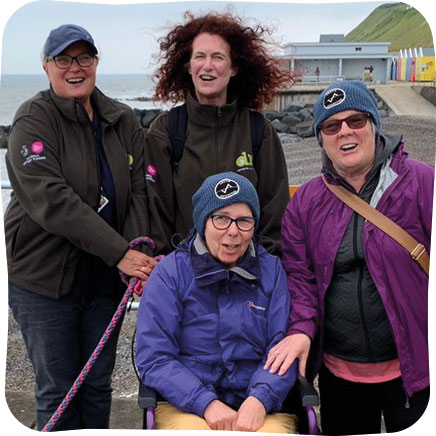Why we exist
Why we exist
Dementia is an umbrella term for different brain disorders that trigger a loss of brain function, for which there is currently no cure. It is the number one cause of death in the UK.
There are around 900,000 people living with dementia in the UK, with that number projected to rise to 1.4 million by 2040.
In fact, someone develops dementia every three minutes. It’s estimated that two-thirds of people with dementia are living in the community and are likely to be looked after by an unpaid family caregiver.
Often a person living with dementia finds that their life changes significantly after diagnosis. They become socially isolated and at risk of being indoors too much of the time, resulting in an unnecessary decline in their physical, emotional and social wellbeing.
Lockdown has disproportionately affected people with dementia. 45% of respondents to a recent Alzheimer’s Society survey said that lockdown has had a ‘negative impact’ on their mental health. Over a third of people living with dementia do not feel confident in going out and getting closer to normality, with the relaxation of some lockdown rules, and a third reported apathy or a sense of ‘giving up’. Around half of carers reported that their loved ones have experienced stress, anxiety or depression.

Nature and the outdoors
Research shows that meaningful activity and connection with the natural environment can have a positive effect on people with dementia (Clarke et al, 2013) and has a positive effect on health and wellbeing (Greening Dementia, Natural England, Woodland Trust & Dementia Adventure, 2013).
Including:
- Improved physical health: Skin health, fitness, sleeping patterns, eating patterns; improved verbal expression; improved memory and attention.
- Improved emotional health: Lifted moods, reduced stress, agitation, anger, apathy and depression.
- Improved social health: Multi-sensory engagement and joy; improved sense of well-being, independence, self-esteem and control and improved social interaction and a sense of belonging.
Being supported to experience these benefits can mean spending longer in the earlier stages of dementia, which can bring improvements in quality of life. Delaying the onset of dementia by five years would halve the number of deaths, saving 30,000 lives a year. (Alzheimer’s Society). Yet many people living with dementia face barriers to accessing these benefits.
Some outdoor activities are inherently more dangerous than others, but does that mean we should never pursue them? If we didn’t take risks, our quality of life would surely suffer. And we would become hermits in our own home, which may lead to quicker progress of the disease.
James McKillop, Living with dementia

Overcoming Barriers
Often carers and professionals are risk averse to getting people with dementia outdoors. Our own research shows that only 20% of people with dementia believe that their dementia is a barrier to taking part in outdoor activities, but 83% of carers believe it is (Is it nice outside?, Dementia Adventure 2016), citing the main issues as:
- Lack of confidence
- Fear of what could happen
- A belief it must be safer inside
- Lack of support
- Lack of knowledge about where to go or what to do
- Physical accessibility
- Lack of transport
- Lack of time
Individuals and organisations need information, skills and confidence to support people with dementia to live well by connecting to nature and meaningful outdoor activity. The benefits could lead to a substantial saving to health and social care services.
Now, more than ever, people living with dementia need our support. This is the challenge ahead of us as a society and it is why Dementia Adventure exists.
Learn more about our approach.




